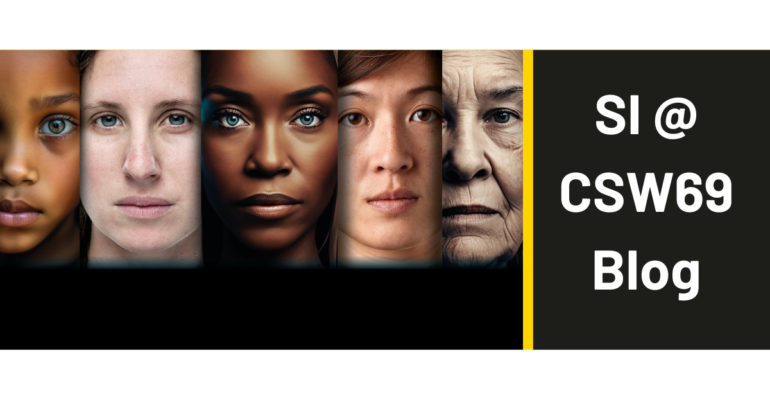Blog by Cherrie Power – SI Shepparton and SI Melbourne
While attending the 69th session of the Commission for the Status of Women (CSW69) at the UN in New York I had the pleasure of attending a parallel event titled ‘The Beijing Declaration Through the Lens of Indigenous Peoples’.
It asked the quintessential question ‘How impactful has the Beijing Platform for Action been in indigenous communities?’
We heard from Ms. Jessica Isacha and Ms. Ana Lucia Torres from Ecuador. They spoke about Indigenous women’s health rights in Ecuador, including progress and challenges. The girls explained that Ecuador is a constitutional state founded on rights and justice, where health is a right guaranteed by the state.
This includes access to water, food, education and other essentials that sustain ‘good living for their people’. However, despite constitutional protections, indigenous women and girls face challenges including discrimination and racism, poverty, limited education, exclusion from policy making and inadequate access to resources that enable their empowerment.
The current status of women’s health rights in Ecuador
Access to health services:
- Indigenous communities are located in remote areas, which makes access to health services difficult.
- The shortage of medical personnel and resources in health centres in Indigenous communities limits the capacity to deliver adequate medical care.
- Lack of medical personnel who speak the Indigenous language and understand the local culture can create barriers to effective communication and medical care.
- Out of pocket expenses due to limited resources inside the health system.
Sexual and reproductive rights
- High prevalence of violence against women and girls, including physical, psychological and sexual violence.
- Limitations in access to sexual and reproductive health education, leaving them vulnerable to exploitation and violence and increased maternal and infant mortality rates.
Food security
- Limited access to land: Indigenous women face difficulties in accessing land and productive resources which limits their ability to produce food.
- Insufficient access to technology and resources, such as agricultural tools and seeds, can reduce the productivity and the quality of crops.
- Climate change can affect the availability and quality of food, which is having a disproportionate impact on Indigenous women and girls.
Challenges and Resilience: Women’s Struggles for Justice and Equality
We also heard from Ms. Leonilla Wapi from Papua New Guinea. She spoke about political corruption and domestic violence towards women. Ms. Wapi stated that their rich culture inhibits gender equality, that 60 per cent of women in Papua New Guinea have experienced physical violence from their partner.
She said it takes a lot of energy to hope for continued progress in gender equality. Ms Wapi shared her feeling that 30 years is something to celebrate but it is likely to take another 30 years to achieve one step forward in gender equality for the women and girls of Papua New Guinea. She summed up by saying ‘Without inner change there will be no outer change, without outer change, there will be no change at all’.
Miigan’agan, clan mother of the Wabanaki people in Quebec spoke about how women are the utmost priority for value, dignity and honour. Yet, they have not benefited from the significance and mission of the Beijing Declaration and Platform for Action, continuing to endure the impact from poverty, violence, human trafficking, drug cartels, rape and murder. She said, “Our voices are woven together, and our stories are very much the same”.
Ms. Jenny Black Bear and Ms. Caroline DeCory spoke about the impact on the Indigenous communities in South Dakota. In this place women are regarded as sacred since they are the life givers of the nation. Although there are a lot of women in leadership roles and in tribal government and legally binding treaty rights for the communities on the reservation exist, these are not being fulfilled.
There is widespread poverty, and the health care system is fragmented. They also spoke about the 5,712 women and girls that are missing, of which only 116 of these cases have been lodged with the Department of Justice). These missing women are not being investigated because of a jurisdictional and systematic issue. These cases are not appearing in the news and are not being recognised. Women on the reservations are holding memorial walks to maintain the memories of these women and to highlight the issue.
Throughout all of this, these women remain positive and hopeful for change.

